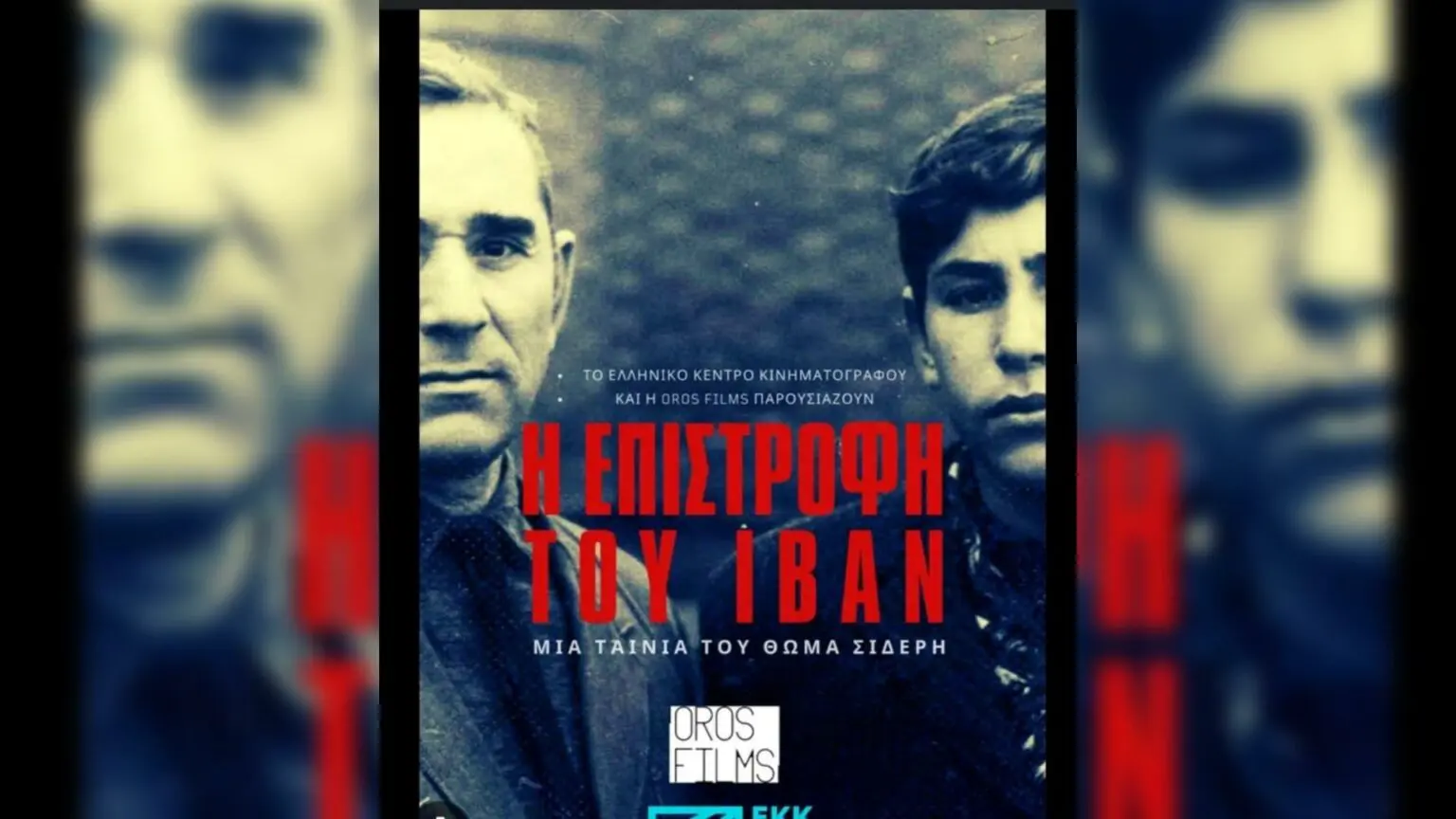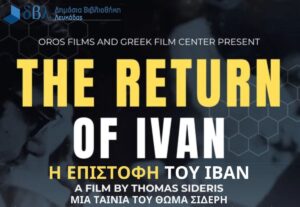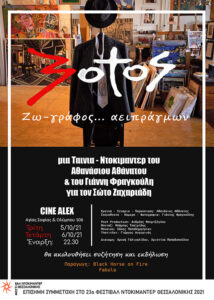THE RETURN OF IVAN
Απρ 15, 2025 Κινηματογράφος 0

MOVIE REVIEW
THE CINEMA OF RECORDING
The return of Ivan: written by Giannis Fragoulis
We watched the film «The return of Ivan», by Thomas Sideris, at the 27th Thessaloniki Documentary Festival. The film was not screened in one of the competitive sections of the festival, for some unknown reason, although its quality was excellent, as you will read in this review. The director is an anthropogeographer, has, in this field, a PhD, is a journalist and director with five films to his credit, including this one, «The murky river of Bashim» (2018), «The pomegranates of Nagorno Karabakh» (2022), «Marriage in Afrin» (2023) and «Gas station or the pigeons of Lahore» (2024), he is an award-winning director in Greece and abroad.
The return of Ivan: The movie
An ongoing war deprives a man of the possibility of returning to his occupied village and so, with the help of memory and narrative, he travels to his birthplace, imaginatively. At the same time he tries to understand what belongs to him now and how his friends have changed their views and sides. The Russian-speaking journalist and writer, Ivan Avramov, is the protagonist of Thomas Sideris’ documentary film «The return of Ivan».
The documentary was filmed in Ukraine and Russia, with Ivan Avramov as the main narrator, who now lives with his family in Kiev and deals with the ghosts of the past. He recites «Requiem», by Anna Akhmatova, he does not want to see or hear his old friends who support Russia. He complains that his pension is not enough to live on. He refers to the mineral wealth of Ukraine in an unsolicited way, long before Trump’s ascension to the presidency. He hopes one day to return to his ancestral homeland, Russian-conquered Urzov, to venerate the graves of his parents and grandparents. Moreover, he feels sorrow for the defenceless people in the maelstrom of global geopolitical developments and the constitution of multiple identities in a fragmented world.
The return of Ivan: His cinema
Thomas Sideris’ camera sees Ivan as an observer who simply listens to the speaker in order to form his opinion of him. As the film time progresses, we enter Ivan’s cognitive and mental world. In this way we see this realm which is a projection of what is going on, economic situations, war conflicts, oppressions of people, their exclusion from geographical and ideological spaces. In other words, Ivan is the space where all that has been and is being done is inscribed.

We hear what the protagonist of the film says, imagine the details, connect these elements and build our own narrative. In this sense, the document becomes fiction, which in the editing process is structured. In this film, the theory of cinema is verified. Jean Rouch states that what we see in a film is not the document, but what our unconscious has created, on the basis of what we see, in our conscious. This is the structure of fiction and, to such films; we refer to them as cinematographic films rather than documentaries, so as to distinguish them from those that are written for television.
The return of Ivan: The narrative
The director keeps a distance from what is said. He knows, as an anthropogeographer, that he must first take in what is said or done and then form his opinion. He does not state his opinion. This poses a problem: one may believe that one subscribes to the opinion of the Russians or that of the Ukrainians. In this way he may be misunderstood and may be disrespectfully subjected to the polemics of those who do not understand the power and dualism of the narrative.
If we have the first reading of the situations by the director, the viewer makes the second reading and the filmic text acquires different forms that propose a narrative sphere that is the multidimensional form of the film’s narrative. A very good and interesting film that, wherever it plays, you should run to see it. It is worth constructing your own narrative world of the Russo-Ukrainian conflict.
THE RETURN OF IWAN
Directed by Thomas Sideris
Screenplay: Thomas Sideris, Sofia Prokopidou
Photography by Mahir Kilic, Viaechlav Tverdokhlib
Editing: Yorgos Halabalakis
Sound: Georgia Glinatsis
Narration: Thomas Sideris
Producers: Penelope Makrynioti
Colour: colour, black and white
Production country: Greece, Ukraine
Year of production: 2024
Duration: 95΄
For more information about casting and technical characteristics, see here.
Read the reviews we have published
Σχετικά άρθρα
-

-
 EN FANFARE
EN FANFAREΑπρ 12, 2025 0
-
 RETURN TO HOMELAND
RETURN TO HOMELANDΑπρ 09, 2025 0
-

Στην ίδια κατηγορία
-
 ΤΟ VIDEO CHANNEL
ΤΟ VIDEO CHANNELΑπρ 15, 2025 0
-

-
 Η ΕΠΙΣΤΡΟΦΗ ΤΟΥ ΙΒΑΝ
Η ΕΠΙΣΤΡΟΦΗ ΤΟΥ ΙΒΑΝΑπρ 14, 2025 0
-
 ΠΡΙΝ ΤΟ ΤΕΛΟΣ
ΠΡΙΝ ΤΟ ΤΕΛΟΣΑπρ 13, 2025 0
Αναζήτηση
-
 WONDER WOMAN
WONDER WOMANΙούν 09, 2017 138
-
 ΠΑΙΔΙΚΗ ΣΚΗΝΗ
ΠΑΙΔΙΚΗ ΣΚΗΝΗΟκτ 12, 2014 2
-
 ΚΛΗΡΩΣΗ ΠΡΟΣΚΛΗΣΕΩΝ
ΚΛΗΡΩΣΗ ΠΡΟΣΚΛΗΣΕΩΝΜαρ 22, 2014 2
-
 ΔΥΟ ΜΕΡΕΣ, ΜΙΑ ΝΥΧΤΑ
ΔΥΟ ΜΕΡΕΣ, ΜΙΑ ΝΥΧΤΑΝοέ 13, 2014 2
-
 ΑΧΙΛΛΕΑΣ ΨΑΛΤΟΠΟΥΛΟΣ
ΑΧΙΛΛΕΑΣ ΨΑΛΤΟΠΟΥΛΟΣΝοέ 09, 2014 2
-
 ISTABUL FILM FESTIVAL
ISTABUL FILM FESTIVALΜαρ 08, 2014 2
-
 ΤΟ VIDEO CHANNEL
ΤΟ VIDEO CHANNELΑπρ 15, 2025 0
-

-
 THE RETURN OF IVAN
THE RETURN OF IVANΑπρ 15, 2025 0
-
 Η ΕΠΙΣΤΡΟΦΗ ΤΟΥ ΙΒΑΝ
Η ΕΠΙΣΤΡΟΦΗ ΤΟΥ ΙΒΑΝΑπρ 14, 2025 0
-

-
 ΠΡΙΝ ΤΟ ΤΕΛΟΣ
ΠΡΙΝ ΤΟ ΤΕΛΟΣΑπρ 13, 2025 0

Δείτε το τρέιλερ της ταινίας μας, που συμμετέχει το Φεστιβάλ Ντοκιμαντέρ Θεσσαλονίκης.
SOTOS, EVERLASTING PAINTER (TRAILER)
Youtube
Επικοινωνήστε
ΓΙΑΝΝΗΣ ΦΡΑΓΚΟΥΛΗΣ
Email: info@filmandtheater.gr
Τηλ: (+30) 6974123481
Διεύθυνση: Ιωαννίνων 2, 56430, Σταυρούπολη Θεσσαλονίκη
![]()

